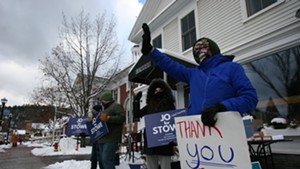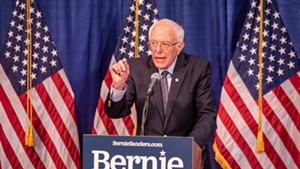Also never in doubt: U.S. Rep. Peter Welch's (D-Vt.) reelection. He easily fended off challenges from four independent candidates, a Republican
to maintain his at-large seat in the House of Representatives. Welch was first elected to Congress in 2006. The AP called the race for him at 7:03 p.m.
As of 2:00 a.m., Welch had 65 percent of the vote to 26 percent for his closest challenger, Republican Miriam Berry of Essex.
Neither Sen. Patrick Leahy (D-Vt.) nor Sen. Bernie Sanders (I-Vt.) were on the ballot Tuesday. Leahy is up for reelection in 2022, Sanders in 2024. But if Democrats retake the U.S. Senate in the election, both men could be in line for committee chairmanships.
At a virtual event for Vermont Democrats Tuesday night, Welch said he was looking forward to the party's congressional gains and to the prospect of Leahy chairing the Senate Appropriations Committee, in the event the Dems take the chamber.
"We're going to be able to return to the reasons that motivated each of us to get into politics in the first place," Welch said. "It's about using government to try to solve difficult problems in a way that's helpful to everyday people."
Across Lake Champlain in New York’s 21st congressional district, incumbent U.S. Rep. Elise Stefanik (R-N.Y.) easily fended off Tedra Cobb, a Democrat who challenged Stefanik for the second time.
Back in Vermont, Winooski voters overwhelmingly approved a ballot item to allow noncitizen immigrants to vote in local elections, the second Vermont municipality to pass what’s known as “all-resident voting” in as many years.
The measure passed 2,479 to 999, according to unofficial results Tuesday night. The “yes” vote is to change the city’s charter, a decision that the state legislature and governor must now approve. Noncitizens would be able to vote in city and school elections; state and federal races remain off-limits.
The vote is significant for Winooski, a city of 7,300 that boasts Vermont’s most diverse population and the state’s only majority-minority school district. Nearly 10 percent of residents there are not U.S. citizens.
Prashant Singh, an Indian immigrant who moved to Winooski in 2014, was nearly speechless when
Seven Days told him the result of the vote.
“That’s great news,” he said just before 7:30 Tuesday night, adding, “I don’t have words to say, but I’m so, so happy.”
Singh was one of two noncitizens to serve on Winooski’s Charter Commission, which helped bring the item to the ballot. His application for legal permanent residency has been in a queue for four years, and he would have to hold that status for five years before he could apply for citizenship. Meantime, he works in Winooski, owns a home there and sends his children to Winooski schools.
Proponents of the measure argued that situations such as Singh’s amount to taxation without representation. Opponents, however, said that voting is a sacred right that should be reserved for American citizens.
Charter commission chair Liz Edsell said the vote affirms that Winooski strives to be an inclusive, multicultural city.
“There are many challenges and barriers to that, and this is one barrier that we’re breaking down,” she said, adding, “This is a very tangible, positive step forward for our community and for our democracy.”
Montpelier voters adopted a similar charter change in November 2018, but the measure stalled in the Statehouse. The bill must be reintroduced next year in the Senate. Unofficial results show that 3,734 voters cast ballots on Tuesday, a 68 percent voter turnout.

















Comments
Comments are closed.
From 2014-2020, Seven Days allowed readers to comment on all stories posted on our website. While we've appreciated the suggestions and insights, right now Seven Days is prioritizing our core mission — producing high-quality, responsible local journalism — over moderating online debates between readers.
To criticize, correct or praise our reporting, please send us a letter to the editor or send us a tip. We’ll check it out and report the results.
Online comments may return when we have better tech tools for managing them. Thanks for reading.